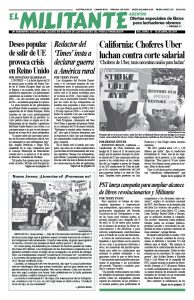April 18, 1994
Battle lines were drawn one minute past midnight April 6 across the United States as more than 75,000 Teamsters left trucks, loading docks, mechanical shops and offices for picket duty when a five-day extension of their national contract with the nation’s major freight bosses expired.
Deep job and pension-cutting concessions demanded by the employers, through a massive increase in the number of low-wage part-time workers, left the union with “no choice but to strike,” Teamster president Ron Carey stated in announcing the walkout — the first national Teamster strike in 15 years.
“We don’t plan to call them,” stated Robert Young, president of ABF Freight Systems and a spokesman for the bosses, “and we don’t expect them to call [us].”
The IAM voted to honor the Teamster picket line until, one unionist said, “they decide to go back.”
April 18, 1969
The success of the massive April 5-6 demonstrations against the Vietnam war offers some important lessons for the future of the movement.
Ever since the beginning of the Paris negotiations some people have insisted that the war was about to end and so there was no real basis — or need — for massive antiwar actions. A different political estimate was made at the GI-civilian antiwar action conference. That meeting in Chicago, held just prior to New Year’s, concluded that Washington was still intent on crushing the Vietnamese revolution and that the bombing pause in the north and the Paris talks were intended to open the way for intensified warfare in South Vietnam.
Moreover, the conference saw that the antiwar forces had the opportunity to add two significant new constituencies to its ranks — the antiwar GIs and the radicalizing high-school youth.
April 15, 1944
Crowding into jammed buses and trains; travelling through weary days and nights; living a catch-as-catch-can existence from day to day, from hour to hour — this is the tortuous lot of America’s newest migrants, the Army wives.
They are thronging into the towns surrounding the army camps, particularly in the west and south, anxious to join their soldier husbands. They come to snatch what happiness they can before their husbands are transferred, or shipped overseas. They experience hardship and humiliation in the overcrowded towns, for the things they need for bare existence — housing, food — have become the objects of gigantic conscienceless profiteering.
The capitalist system stands exposed here in all of its cruelty, its heartlessness, its perfidy. In the midst of the war the government disdains to enforce price ceilings in the army towns.

